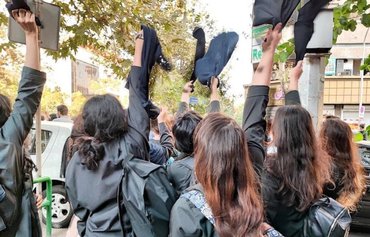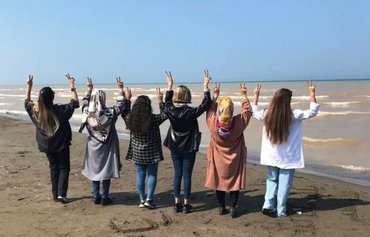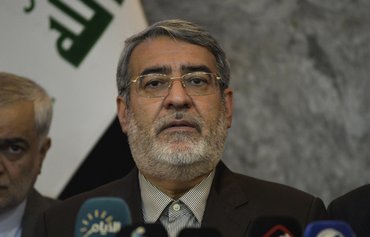Last week's rare visit by Iran's police commander to Russia was in part to learn how to employ more oppressive techniques that would ensure the Iranian regime's longevity, observers tell Al-Mashareq.
The two pariah states have been expanding their ties, especially after Russia's invasion of Ukraine in February 2022.
In March, the Wall Street Journal reported that Moscow was helping Tehran with "advanced digital-surveillance capabilities" in exchange for Iranian drones, which Russia is using against Ukrainian targets.
On June 29, at the end of his three-day trip to Moscow, Brig. Gen. Ahmadreza Radan, Iran's overall commander of the Law Enforcement Forces (LEF), said Iran and Russia have reached "good agreements".
![Iranian leader Ali Khamenei appointed Ahmadreza Radan as overall Law Enforcement Forces commander in January. [Qudsonline.ir]](/cnmi_am/images/2023/07/07/42902-Iran-Radan-LEF-600_384.jpg)
Iranian leader Ali Khamenei appointed Ahmadreza Radan as overall Law Enforcement Forces commander in January. [Qudsonline.ir]
![Protests against women's mandatory hair coverage began in Iran in September. [Independent Persian]](/cnmi_am/images/2023/07/07/42903-Iran-protests-coverage-600_384.jpg)
Protests against women's mandatory hair coverage began in Iran in September. [Independent Persian]
He said the agreements aim "to develop co-operation in cyberspace and digital space, counter-terrorism, efforts to combat drug smuggling and overall co-operation at the borders".
Radan met with officials of Russia's Security Council, Federal Intelligence Service and the Interior Ministry, as well as the commander of Russia's National Guard.
According to Iranian media, Radan's visit included seeing up close "Russian police's capacities in combating organised crime".
During his meeting with Nikolai Patrushev, who has chaired Russia's Security Council for 15 years, the two discussed co-operation on "special services", Nournews, the outlet run by Iran's Supreme National Security Council, reported, without giving more details.
Patrushev himself visited Iran last November at the height of unprecedented public protests in Iran that began in September, after the death of a young woman in "morality police" custody.
The protests were the most widespread since the 1979 Islamic Revolution.
'Notorious Radan' takes over
In January, Iranian leader Ali Khamenei appointed Radan, a former official of the Islamic Revolutionary Guard Corps (IRGC) and former commander of Tehran's LEF, as the overall commander of the LEF.
Radan, 59, is a well-known IRGC figure who has been sanctioned by the United States and the European Union.
He was the commander of Tehran's LEF during the 2009 protests following the disputed presidential elections that saw Mahmoud Ahmadinejad become president for the second time -- protests that became known as the "Green Movement".
Radan has held various posts within law enforcement, including his most recent as the director of the LEF's Strategic Studies Centre.
He joined the IRGC's paramilitary Basij force as a teenager during the Iran-Iraq war and rapidly rose through the IRGC ranks, reaching second brigadier general in 1984, at the age of 20.
He was appointed to several sensitive positions after the war, including commander of Kurdestan province's State Security Force (SSF), after which he held the same post in Mashhad.
As the Tehran LEF commander, Radan was notorious for severely clamping down on any protest -- albeit minor.
He was also notorious for his ruthlessness in enforcing the strictest rules for mandatory hair coverage for women and outlawing certain hairstyles for men -- which he described as "un-Islamic"-- by expanding the "morality police".
His forces would often storm men's barbershops, bachelor pads and photography studios.
He also announced an unprecedented ban on neckties for physicians at medical centres. Although wearing neckties has been largely banned as an unwritten, unspoken rule since the Islamic Revolution, certain groups, including physicians and lawyers, had continued to wear them at work.
During a television interview that later went viral, in response to a question about the brutality of his methods, he famously said, "We are not joking with anyone".
Face of crackdown
Radan's notoriety mostly stems from the way he cracked down on the Green Movement and threatened the protesters.
Khamenei's decision to appoint him to the LEF command after four months of widespread protests did not come as a surprise to many.
Before the appointment, leaked internal bulletins from the IRGC-affiliated Fars News demonstrated the Iranian leader's concerns about the protests.
An Iranian journalist who asked to remain anonymous said the range and seriousness of the recent protests were so concerning that Khamenei felt "the desperate need to appoint the regime's cruelest entrusted figure to quash them".
"Radan easily and brutally kills people, imprisons dissidents and quells peaceful protests, and Khamenei knows that the only way to maintain power is by enforcing brutal clampdown methods," he told Al-Mashareq.
"Radan is the regime's lifeline, and his trip to Russia and meetings with Russian officials, who have long been the Islamic Republic's puppeteers, are aimed at securing that lifeline."
The LEF commander may have been sent to Russia to learn more oppressive techniques that would ensure the regime's longevity, or at least that seems to be what Iranian officials are hoping for, said the journalist.
Similarly oppressive methods
The continued disruption of internet connections in Iran, even though protests have largely been quelled, shows the regime's ongoing concerns about potential renewed protests.
Iran and Russia have employed similar means of oppression in the face of public protests or uprisings.
Both nations have levelled false allegations of espionage against foreign nationals and dual citizens as a means of turning them into pawns.
In Iran, a number of foreign nationals and dual citizens have been arrested and imprisoned over the years. As in Russia, many have been accused of espionage.
The similarities between the methods of detention, interrogation, forced confessions and torture indicate that Iran has copied Soviet and modern-day Russia in pursuing dissidents, analysts with knowledge of the situation said.
"If you read the ways prisoners were interrogated in Soviet Russia, as well as today's Russia, you can clearly see that what the Iranian regime does is rather similar to what the Russians do," an Iran-based politics professor said.
Iran is still meting out harsh punishments on defendants suspected of involvement in mass protests, including "chilling" executions, a United Nations fact-finding mission said July 5.
Iran performed at least 354 hangings in the first six months of 2023, Iran Human Rights (IHR) said July 3, adding that the pace of executions was up 36% on the same period in 2022, AFP reported.

![Ahmadreza Radan has long been a close confidante of Iranian leader Ali Khamenei. [leader.ir]](/cnmi_am/images/2023/07/07/42901-Iran-Radan-Khamenei-600_384.jpg)






